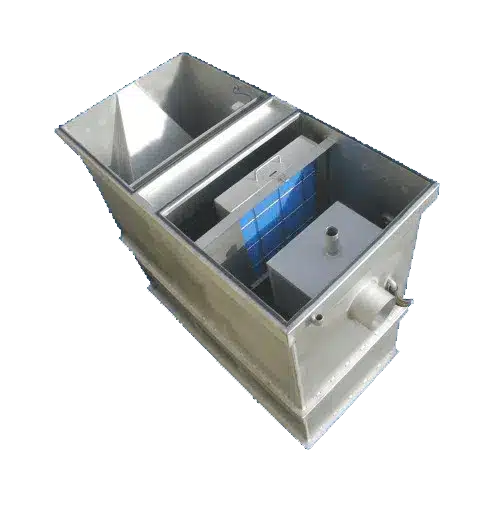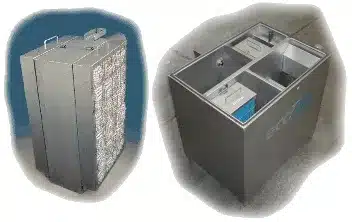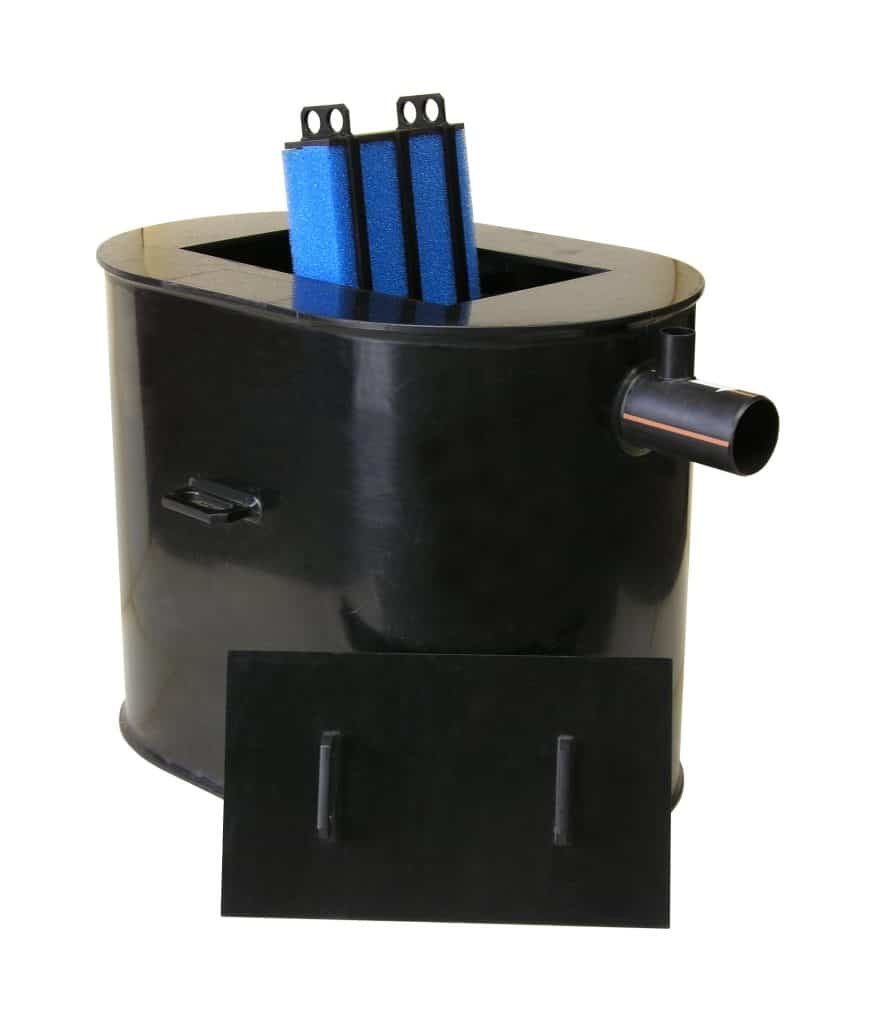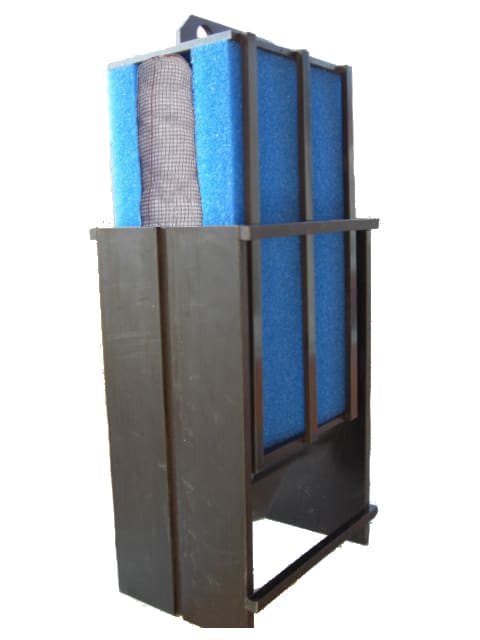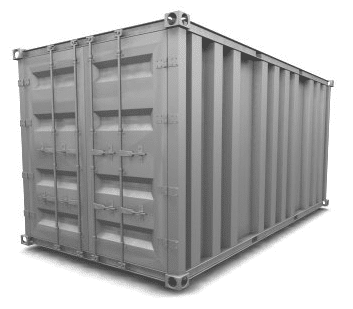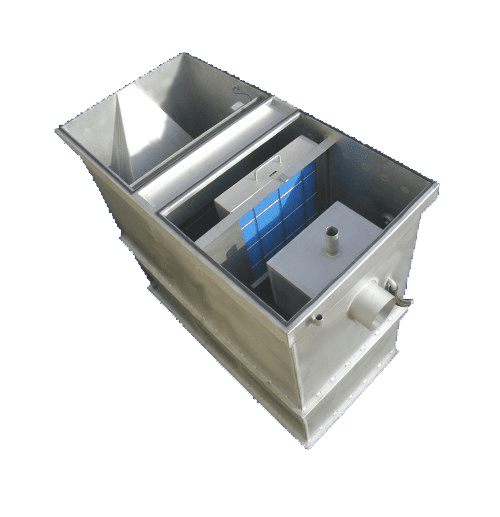Are Maine’s waterways at risk from industrial runoff? Maine Above Ground Oil Water Separators are key to protecting Maine’s water. They are vital for managing stormwater and following environmental laws in various industries.
Maine has strict rules for businesses to keep its water clean. Above ground oil water separators remove oil and other harmful substances from water. This makes sure the water in Maine’s rivers, lakes, and coasts stays healthy.
Advanced technology from companies like Freytech Inc. makes these separators work better. They can cut down oil in water to as low as 5 parts per million. Some top models even remove trace amounts of emulsified oil, getting down to 0.1 PPM.
Key Takeaways
- Above ground oil water separators are vital for Maine’s environmental protection
- These systems help businesses comply with state and federal regulations
- Advanced separators can achieve hydrocarbon removal below 5 PPM
- Effective stormwater management protects Maine’s water resources
- Proper wastewater treatment is crucial for industrial environmental compliance
Understanding Maine’s Regulations for Oil-Water Separation
Maine is serious about keeping its waters clean. It has strict rules for handling industrial wastewater to stop pollution. These rules protect the environment and people’s health.
Maine Department of Environmental Protection Guidelines
The Maine DEP has clear rules for separating oil and water. Companies must check their drains and how they dispose of waste. This stops soil and groundwater from getting polluted. The DEP sorts liquid waste into low and high risk groups, each with its own rules.
Importance of Proper Wastewater Management
Good wastewater management is key for Maine’s industries. It means using the right gear and doing things the best way. This includes having spill containment systems and keeping oil-water separators in good shape. These steps lower the chance of harming the environment and follow state rules.
Compliance with State and Federal Standards
Maine companies must follow state and federal rules for wastewater treatment. This means connecting drains right, using holding tanks, and getting permits for waste discharge. Regular checks and keeping records are important to stay in line and avoid fines. By doing this, companies help prevent pollution and protect the environment.
Maine Above Ground Oil Water Separators: Features and Benefits
Maine’s above ground oil water separators are top-notch for managing wastewater. They use the latest technology to tackle hydrocarbon removal and water recycling in many industries.
Advanced Coalescing Technology
The key to these systems is their advanced coalescing technology. This tech boosts the separation process. It helps remove different oils like motor oil, diesel, and jet fuel effectively. Thanks to this, Maine’s separators are great at getting rid of hydrocarbons.
Efficiency in Hydrocarbon Removal
Maine’s separators are top performers in removing hydrocarbons from water. They can get separation rates below the 10 PPM limit. This meets strict environmental rules. Their efficiency is crucial for industries with oil-contaminated wastewater.
Customizable Solutions for Various Industries
Maine offers customizable oil-water separation solutions for different sectors. These include automotive, manufacturing, and oil and gas industries. This adaptability ensures the systems work well in various settings. It helps with effective hydrocarbon removal and water recycling.
Installation and Maintenance of Above Ground Separators
Setting up oil-water separation systems needs careful planning and following state rules. Before starting, facilities must get the right permits and send their plans to the State Fire Marshal’s Office. This makes sure they meet safety and environmental standards.
Keeping these systems in good shape is key. Facilities should check them often for any damage or wear. Cleaning them regularly stops contaminants from building up and keeps the oil and water apart.
Getting rid of the waste properly is also crucial. Facilities must follow strict rules for handling and throwing away oil and pollutants. This keeps the environment safe and meets discharge limits.
It’s important to have spill prevention and containment plans for these systems. These plans show how to act fast if there’s a leak or spill. This helps reduce risks to the environment from industrial wastewater. By doing this, businesses can keep their oil-water separation systems working well and protect local water sources.
These separators are crucial in storm water systems. They process runoff to meet the US EPA’s Clean Water Act standards. With effective oily water treatment, facilities protect the environment and dodge big fines.
Environmental Impact and Stormwater Management
Maine’s water resources face challenges from industrial activities and urban growth. Above ground oil water separators are key to protecting these ecosystems. They manage stormwater runoff and treat industrial wastewater. This helps with environmental compliance and pollution prevention across the state.
Protecting Maine’s Water Resources
Managing stormwater is vital for Maine’s lakes, rivers, and coasts. Oil water separators filter out harmful contaminants from runoff. This keeps water quality high and protects habitats for plants and animals.
Reducing Pollution from Industrial Wastewater
Industrial facilities produce wastewater with oils, greases, and pollutants. Above ground separators remove these contaminants before discharge. This reduces a business’s environmental impact and shows a commitment to preventing pollution.
Compliance with North American Discharge Limits
Meeting environmental standards is crucial for Maine businesses. Above ground oil water separators help meet strict North American discharge limits of 10 PPM or less. This ensures water released is safe for ecosystems and public health, avoiding fines or penalties.
Conclusion
Maine Above Ground Oil Water Separators are key to protecting the environment and following the law. They help businesses across the state manage their wastewater and keep pollutants out of water sources. These systems use advanced technology to meet strict state and federal standards, protecting Maine’s water.
It’s important to install and maintain these separators well for them to work long-term. Regular care keeps them running right and helps businesses avoid big fines for not following the rules. Investing in good oil water separators leads to better environmental care and more efficient operations.
Freytech Inc. offers top-notch separator packages for Maine businesses. These solutions remove hydrocarbons well, helping companies stay in line with environmental laws. By picking the right Maine Above Ground Oil Water Separators, businesses can work responsibly and help keep Maine beautiful for the future.

